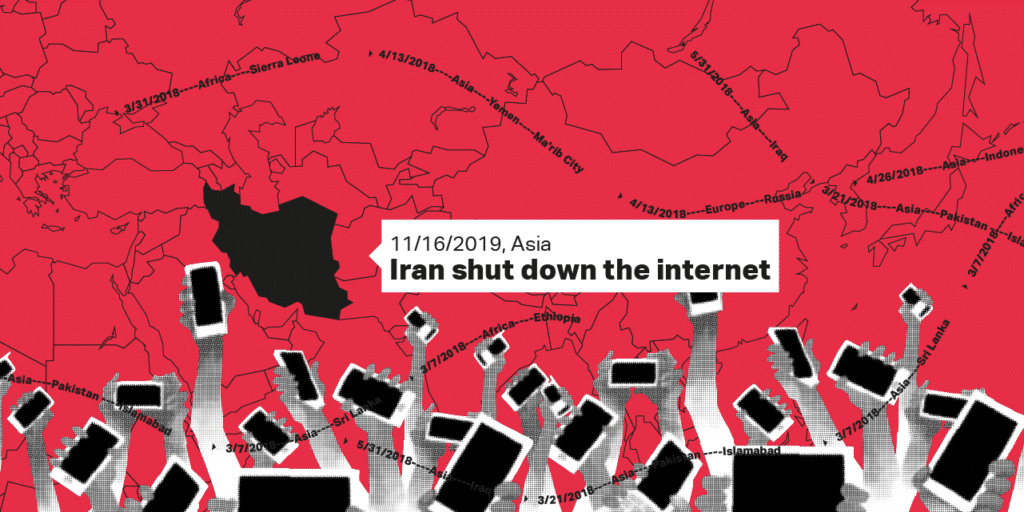A rushed decision by the Iranian government to raise fuel prices by 50%, after years of political and economic instability and threats to human rights, has forced Iranians across the country into the streets to demand change. According to Amnesty International, at least a dozen protesters have been killed, many injured and more than a thousand have been arrested.
As more people joined demonstrations, the government responded by imposing a blanket internet shutdown starting on November 16, following a day of protests. Iran has previously throttled and censored the internet, including blocking the popular app Telegram. For that reason, Access Now and ARTICLE 19 emphasized that Iran must protect freedom of expression online, especially during protests, both in our open letter to Iran last year and in our recent joint submission to the United Nations in the Universal Periodic Review of Iran’s human rights record.
This time, the shutdown is different. Iran is cut almost completely off of the grid, and according to numerous groups in the internet outage measurement community, the method Iran used to carry out this specific shutdown diverges from a “typical” blanket shutdown and its comprehensive nature makes it harder to circumvent. That makes what is already an inherently disproportionate interference with Iranians’ human rights even more harmful and dangerous.
While authorities in Sudan and Iraq have implemented shutdowns that blocked internet access across these countries all at once, Iran evidently cut off connections in a step-by-step process. According to Doug Madory of Oracle’s Internet Intelligence, who analyzed the shutdown, while Iraq has the infrastructure to essentially “turn off” access to the whole internet in one go, in Iran, service providers have cut connections successively in a multi-day process.
According to experts who have spoken with Access Now, the government targeted mobile internet first, then fixed lines, followed by short message services (SMS), so that each channel for circumvention disappeared one by one. As the country went off the grid, websites hosted within Iran were not available outside of the country.
On November 17, one day after implementing the shutdown, authorities briefly restored internet access. Amir Rashidi, an internet security researcher, was able to observe massive attacks against messaging platforms, as well as the blocking of circumvention tools. Soon after, according to Rashid, the Iranian government sent messages to data centers and those who were still connected to the internet to warn them against setting up or providing circumvention tools.
Today, four days after the shutdown began, the majority of Iranians remain disconnected from the global internet. Iranians who may have nothing to do with the protests, as well as those who may be hurt or dying, are cut off from their loved ones and the rest of the world. The Office of the U.N. High Commissioner for Human Rights has now issued a press briefing that underscores the need for Iran to protect human rights and restore access to the internet:
“As Iran is a State party to the International Covenant on Civil and Political Rights, we call on the Iranian authorities to respect the right to freedom of expression, and the right to peaceful assembly and association, as laid down in the Covenant, which is a binding international treaty.
We also call on the Government to immediately re-establish Iranians’ access to the internet, as well as other forms of communication, which allow for freedom of expression and access to information.”
Once again, Access Now is calling on Iran’s government to end its unnecessary and inherently disproportionate restrictions on freedom of expression online. We also urge telcos, data centers, and other tech companies operating in the country to consider how they will meet their duty to respect human rights in the face of blocking orders, and push back with their legal, political, and economic power against any contribution to human rights violations. Notifying affected users of the reason for the outages, and fighting the government in court, are two options for the companies right now.
We encourage you to add your voice to the many who are fighting for the restoration of internet services in Iran. Follow #Internet4Iran to learn more and urge authorities to restore internet access and #KeepItOn.
